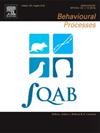Effects of probabilistic win-paired-cues on loss trials on risky choice in rats
IF 1.3
4区 生物学
Q4 BEHAVIORAL SCIENCES
引用次数: 0
Abstract
Gambling Disorder affects 1.4 % of the global adult population and can result in detriments to physical, mental, and financial well-being. Electronic gambling machines may be more addictive than other forms of gambling. Electronic gambling machines present a series of audiovisual stimuli concurrently with winning and some losing outcomes. Previous research in human and non-human animals has found increased levels of risky choice when audiovisual stimuli are presented with wins compared to their absence. The present study was arranged to evaluate how a visual stimulus paired with winning outcomes, and presented on some losing outcomes, would influence risky choice in rats using a probability-discounting paradigm. A choice between a smaller, certain outcome and a larger, uncertain outcome (with changing probabilities) was presented. A visual cue was always presented with winning outcomes and was systematically implemented on a proportion of outcomes where a choice was made for the uncertain alternative, but no food reinforcement was delivered. Increases in risky choice were found when the win-associated stimulus was presented on half of all losing outcomes, relative to when it was omitted. Increases in risky choice were observable when choice was between relatively equal value choices and when the value of the smaller, certain alternative was only slightly higher than that of the larger, uncertain alternative. Risky choices were also more likely following a losing trial with the presentation of the win-paired cue than following a win or a loss without the win-paired cue. Implications in electronic gambling machines are discussed.
概率赢对提示对大鼠风险选择失败试验的影响
赌博障碍影响了全球成人人口的1.4% %,并可能对身体、精神和财务健康造成损害。电子赌博机可能比其他形式的赌博更容易上瘾。电子赌博机提供一系列视听刺激,同时伴有输赢结果。先前对人类和非人类动物的研究发现,当视听刺激出现时,与没有出现时相比,它们的风险选择水平更高。本研究的目的是利用概率贴现范式来评估视觉刺激与获胜结果的配对,以及对一些失败结果的呈现如何影响大鼠的风险选择。在一个较小的、确定的结果和一个较大的、不确定的结果(具有变化的概率)之间进行选择。视觉线索总是呈现获胜结果,并系统地执行一定比例的结果,即选择不确定的替代方案,但没有提供食物强化。研究发现,当输赢相关刺激出现在所有输赢结果的一半上时,风险选择的增加,相对于不出现输赢相关刺激的情况。当在价值相对相等的选择之间进行选择时,当较小的、确定的选择的价值仅略高于较大的、不确定的选择的价值时,风险选择的增加是可以观察到的。与没有提示的输赢试验相比,在输赢试验中出现双赢提示后,受试者更有可能做出冒险的选择。讨论了电子赌博机的影响。
本文章由计算机程序翻译,如有差异,请以英文原文为准。
求助全文
约1分钟内获得全文
求助全文
来源期刊

Behavioural Processes
生物-动物学
CiteScore
2.70
自引率
7.70%
发文量
144
审稿时长
4-8 weeks
期刊介绍:
Behavioural Processes is dedicated to the publication of high-quality original research on animal behaviour from any theoretical perspective. It welcomes contributions that consider animal behaviour from behavioural analytic, cognitive, ethological, ecological and evolutionary points of view. This list is not intended to be exhaustive, and papers that integrate theory and methodology across disciplines are particularly welcome.
 求助内容:
求助内容: 应助结果提醒方式:
应助结果提醒方式:


